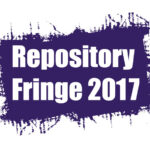Guest blog post by Ewa Lipinska
On 28th August members of the RDM Forum gathered in the stunning Old Library at the Department of Geography in the Old Infirmary building, to hear the latest updates from the Research Data Service team and discuss all things data. It’d been a good few months since the last time we met, so the event presented us with the perfect opportunity to catch up on new developments, network with colleagues working on RDM in different parts of the University, and prepare ourselves for the new academic year which will see the University take up a pivotal role in making Edinburgh the Data Capital of Europe.
We started off with an RDM update from Cuna Ekmekcioglu, who gave us an overview of developments to University research data services: the launch of interim DataVault long-term retention service, continuing development of Data Save Haven aimed at research projects dealing with sensitive data, and a new release of DataShare which will allow larger datasets. We also learned about RDM training courses planned for the new academic year, most of which can be booked via MyEd.
Next, Pauline Ward gave a presentation which went into a bit more detail about the DataVault service allowing researchers to comply with their funders’ requirements to preserve data for the long term in cases where the datasets cannot be made public. The current interim service requires a mediated deposit which can be done by contacting data-support[at]ed.ac.uk. Comprehensive guidance on how to prepare your data before storing it in DataVault can be found on the service website.
This was followed by a demonstration of the new Research Data Service promotional video which outlines the range of tools and support offered by the team, and which can be a very good resource for new members of staff who would like to find out about the types of services available. Diarmuid McDonnell who presented the video also gave us a quick overview of a recent project called Scoping Statistical Analysis Support, which looked at the demand for statistical analysis training for current postgraduate students. The final project report is full of current information about statistical training around the University.
We then went on to discuss the potential impact of data sharing, which tied in nicely with a recent panel discussion at Repository Fringe 2017 that focused on how repositories and associated services can feature in supporting researchers to achieve and evidence impact in preparation for the next Research Excellence Framework exercise (live notes from the day are available). Pauline Ward presented examples of popular public datasets by Edinburgh University researchers, described ways to access information about their usage, and talked about how datasets can be shared more widely to engage external audiences, which may lead to potential impact. Even though on their own research data usage statistics are not enough to demonstrate significant impact beyond academia, they are a good (though perhaps still slightly overlooked) starting point for tracking how and by whom datasets are used, and how that benefits individuals and communities.
The meeting concluded with a presentation by Robin Rice, who shared with us the draft Research Data Service Roadmap. As the goals set out in the previous roadmap have now largely been achieved, the time has come to look to the future and identify new objectives for the next few years. It was interesting to hear about the team’s long-term plans which include unification of the service (aiming to ensure the best user experience and interoperability between systems), advocacy of data management planning, support around active data, enhanced data stewardship, improved communications and more training opportunities.
Overall, it was a very useful and informative meeting, and I’d very much encourage anyone interested in research data management and sharing to join us next time. In the meantime Cuna’s slides, together with lots of other useful resources and points for discussion, are available on the RDM Sharepoint (access on request).
Ewa Lipinska
Research Outcomes Co-Ordinator
College of Arts, Humanities and Social Sciences

 From the Arts
From the Arts